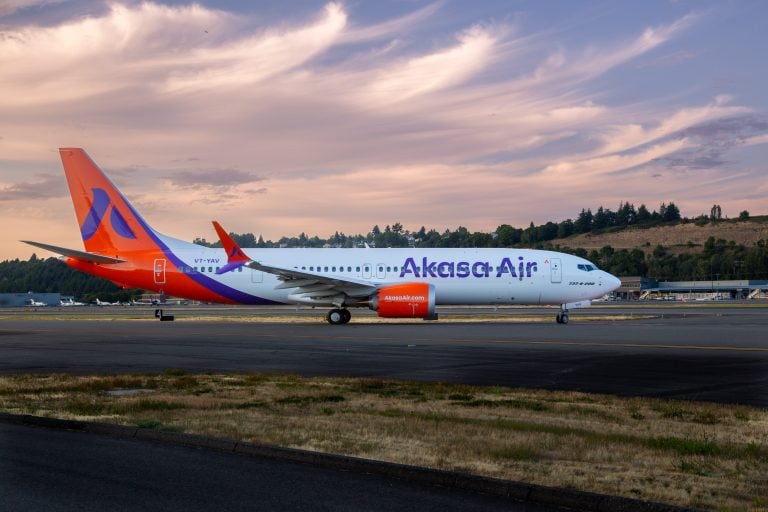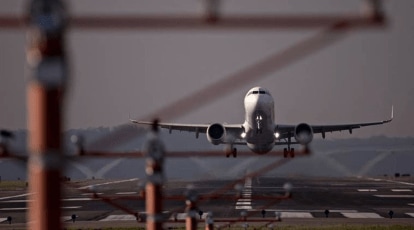Aviation Industry in Turmoil: Akasa Air Faces Imminent Shutdown Amidst Mass Pilot Exodus

Aviation Industry in Turmoil: Akasa Air Faces Imminent Shutdown Amidst Mass Pilot Exodus
In a shocking turn of events that have sent shockwaves through the Indian aviation sector, Akasa Air, one of the country’s emerging airlines, has sounded the alarm of an impending shutdown. The dire predicament has arisen due to the abrupt departure of 43 of its pilots, who have opted to join a rival carrier. The airline’s management has pleaded its case before the Delhi High Court, citing the severe disruptions caused by the mass resignation, which has left a trail of canceled flights in its wake.
The upheaval began when 43 pilots, without serving their mandatory notice period, decided to jump ship and take up positions with a competitor. This unforeseen mass exodus has cast a shadow of uncertainty over the future of Akasa Air, a relatively new player in the Indian aviation landscape.
The airline has been forced to cancel a staggering 24 flights per day throughout the month of September, leaving passengers stranded and raising concerns about the broader implications for the aviation industry. This crisis has underlined the fragile nature of the industry’s workforce and the need for immediate intervention to avert a potential catastrophe.

The Pilot Exodus
The exodus of pilots from Akasa Air began with a series of resignations that came as a shock to both the airline’s management and industry experts. These pilots, who had not complied with the standard notice period, cited various reasons for their sudden departure. Some reported dissatisfaction with working conditions, while others claimed that they had received more lucrative offers from rival airlines.
Captain Ramesh Sharma, one of the pilots who resigned, stated, “It’s a difficult decision, but I had to consider my future and my family’s well-being. The offers I received from other airlines were too enticing to ignore.”
The abruptness of these resignations left Akasa Air in a perilous situation. The airline’s spokesperson, Deepika Kapoor, expressed their concerns, saying, “The loss of 43 experienced pilots has put us in a grave predicament. We are doing our best to minimize disruptions to our passengers, but it’s an uphill battle.”
Operational Disruptions
The repercussions of the pilot exodus have been felt keenly by passengers. The airline, which had been steadily expanding its routes and services, has been forced to cancel nearly a quarter of its daily flights for the entire month of September. This disruption has not only inconvenienced travelers but has also raised questions about the long-term viability of Akasa Air.
Frequent flyer Rajesh Mehta, who had booked a flight with Akasa Air, expressed his frustration, saying, “I had to cancel an important business meeting due to the flight cancellation. This is unacceptable, and I hope they resolve their issues soon.”
The cancellations have not only affected passengers but also put pressure on the remaining staff, who are working tirelessly to keep the airline operational. The overworked ground staff and cabin crew are facing increased stress as they attempt to accommodate affected passengers and manage the reduced flight schedule.

Legal Battle in the Delhi High Court
Recognizing the gravity of the situation, Akasa Air has sought legal recourse to address the sudden pilot shortage. The airline has approached the Delhi High Court, presenting its case and requesting an injunction against the pilots who did not adhere to their notice periods.
In their petition, Akasa Air has argued that the pilots’ actions have disrupted its operations and pose a significant threat to the airline’s financial stability. They have also claimed that the pilots are in breach of their employment contracts.
The court proceedings have garnered significant attention, with industry experts closely monitoring the case. The outcome of this legal battle could set a precedent for how such cases are handled in the future and could potentially influence employment practices within the aviation sector.
Impact on the Indian Aviation Industry
Beyond the immediate turmoil faced by Akasa Air, the pilot exodus raises broader concerns about the state of the Indian aviation industry. It underscores the fragility of the industry’s workforce and the need for airlines to address issues such as pilot retention, working conditions, and compensation packages.
The aviation sector, which has already been grappling with the economic fallout of the COVID-19 pandemic, now faces a new challenge. The loss of experienced pilots has the potential to disrupt the recovery efforts of airlines and hinder the growth of the industry.
Industry experts have called for a comprehensive review of pilot employment practices and an examination of the factors driving pilots to seek opportunities with rival carriers. They argue that addressing these issues is essential to ensure the stability and sustainability of the Indian aviation sector.

Government Intervention
In response to the crisis at Akasa Air and its potential repercussions for the wider aviation industry, government authorities have begun to explore options for intervention. The Ministry of Civil Aviation has initiated discussions with airline representatives, labor unions, and industry experts to find a constructive way forward.
One potential solution being discussed is the establishment of guidelines for pilot employment contracts that safeguard the interests of both pilots and airlines. This would include provisions for notice periods, compensation for early departures, and mechanisms for dispute resolution.
The government’s intervention is seen as crucial in preventing similar crises in the future and preserving the integrity of the aviation sector, which is a vital component of India’s economic infrastructure.
Conclusion
The crisis at Akasa Air, triggered by the sudden departure of 43 pilots, has sent shockwaves through the Indian aviation industry. The airline’s struggle to cope with the disruption, including the cancellation of 24 flights a day in September, highlights the vulnerability of airlines to workforce challenges.
As the legal battle unfolds in the Delhi High Court, the outcome will not only determine the fate of Akasa Air but also set a precedent for how similar cases are handled in the future. The crisis has also prompted discussions about the need for industry-wide reforms to address issues of pilot retention and employment practices.
In the midst of this turmoil, the Indian government’s intervention is eagerly anticipated to help chart a path towards stability and sustainability in the aviation sector, ensuring that passengers can continue to rely on airlines to connect them across the country and beyond.




